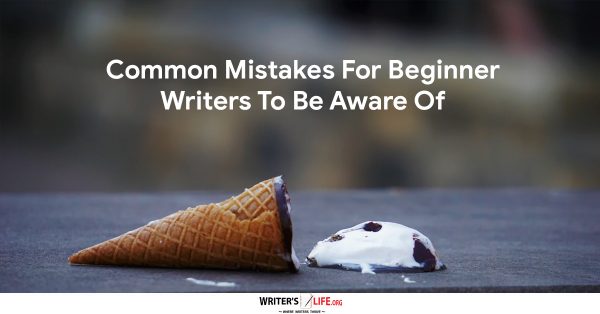- How To Tackle Jealousy In Creative Writing
- Common Submission Mistakes
- How To Stop Your Blog Becoming Boring
- The One Thing Every Successful Writer Has In Common
- How To Make Yourself Aware Of Publishing Scams
- Why Almost ALL Writers Make These Grammar Mistakes At Some Point
- 5 Tips For Authors On How To Deal With Rejection
- Top Mistakes to Avoid When Writing a Novel
- How to Avoid Common New Writer Mistakes
- 10 Mistakes New Fiction Writers Make
How to Avoid Common New Writer Mistakes

"Share, Like or Tweet If You Love Writing"
So you're ready to follow your passion and take the plunge into writing for a living. Great! This will no doubt, prove to be both an exciting and scary new adventure for you. But like any other profession, writing is a job and requires structure and development of hardened skills.
Writing is like any other skill in that you have to do a lot of it to get better. There isn't any way around that, but you can identify mistakes common to new writers and learn to stop making them become they become a habit.
Here are the most common mistakes new writers make:
Trying to sound really, really smart at the expense of clarity.
Writing for publication is extremely competitive (some say as competitive as Hollywood). Which means that writers are often anxious about how others perceive them. But using archaic, complicated words and convoluted sentence structures won't make you sound intelligent; it will make you sound out of touch, or worse -- it will confuse and frustrate the reader, convincing him/her to put down your article or book. Say what you mean as directly, honestly, and clearly as you can.
Saying too much.
This falls under the sage advice to trust your reader. Don't insult your audience's intelligence by including every shred of minutiae when it's not needed.
For example, if the crux of a scene is going to be a big blow-up at the breakfast table between a teen and her parents, you don't need to show the girl waking up to the alarm clock, brushing her teeth, getting dressed, putting on her makeup, stuffing her backpack, etc., before you get us to the kitchen table. The reader will fill in the blanks and understand that the girl had things to do before she headed downstairs.
When details don't contribute to character development or move the story along, skip them. Also, resist the urge to "oversay" (bludgeon the readers with unnecessary repetition because you assume they must have forgotten things).
Saying too little.
This falls under the sage advice to be specific.
Although readers fill in the blanks all the time (as we saw in the above example), sometimes new writers assume that readers can fill in crucial gaps on their own. Because we often have a vivid, detailed picture of our subject in our heads as we write, we get wrapped up in that picture and forget that it needs to be equally vivid and detailed on the page. If you leave huge gaps that even the most attentive reader can't possibly leap over alone, you aren't saying enough.
Be sure there's enough on the page for the readers to make meaningful connections and draw informed conclusions. Include relevant, interesting details in your writing. Make things specific so that your writing is memorable. Remember: seasoned is always better than bland.
Abandoning the promise you made the reader at the beginning of the piece.
If you've written anything that really mattered to you from start to finish, you know how the act of writing stimulates new thoughts and therefore you might end up in an unexpected place when you finish. New writers sometimes forget that ending up somewhere else means that you have to change the starting point.
For example, if your novel opens with unexplained murders and then introduces an armchair sleuth, you're setting the reader up for a mystery. If you change the premise mid-way and shape the work into a romance involving a minor character (and ultimately leave the crimes unsolved), you're breaking the promise you implicitly made your reader. Or maybe your article starts off promising a look at Cleopatra's final days and ultimately ends up with anecdotes about modern-day travel in Egypt.
Forgetting that readers want to be entertained.
Because the story you're working on is so compelling to you, it's easy to forget that others need to be convinced that it's fabulous (especially if it's book-length and you want them to stick with you till the end). This advice applies to fiction and non-fiction writers alike. Unless your book is required reading on a college syllabus, you have to make it worth the reader's while. Since there are so many entertainment choices out there, people won't slog through something that they don't enjoy.
So, now that you know the mistakes, how do you avoid them?
Be aware of them.
You shouldn't cramp your style when you write your first drafts (because you'll get the richest material if your self-edit feature is "OFF"). But click it on when you revise, and look for places you need to correct the above errors in subsequent drafts.
Ask a trusted reader for feedback.
Keep in mind that a trusted reader isn't the person who always tells you how brilliant you are and that your work is perfect (that's "Mom"), but the person who is willing to give you honest feedback, even when it may be hard to hear. Ask that person for very specific feedback. Ask your trusted readers to note places in your work where they felt confused or bored or frustrated.
Read as much as your brain can hold. And then go back for more.
Read loads and loads in the genre you're writing, as well as other areas that interest you. But don't just read for the sake of reading -- read like a writer: reread things that really worked for you. Locate patterns, identify structures, look at the ways experienced writers you admire have avoided the most common mistakes and try to consciously apply that to your own work.
But don't just stop at books you love. When you come across books or articles that make you say, "I could have done this way better," note where the author lost you and think of how you would fix it if you had the chance.
Keep a writing journal.
And the more specific you are, the better. Keep detailed track of your progress, including the things you're reading and what you're learning from them. Describe the steps you're taking in revision. Keep track of how you're faring overall with addressing and avoiding the most common pitfalls new writers face.
Originally posted as Common Mistakes New Writers Make and How to Avoid Them on fictionfactor.com. Photo by makingalivingwritingromance.com.
URL: http://www.fictionfactor.com/guests/commonmistakes.html
"Love Writing? Then Share, Like or Tweet This Article"



























